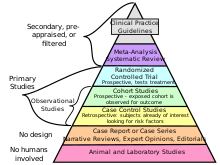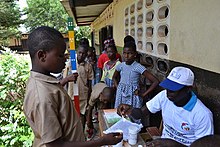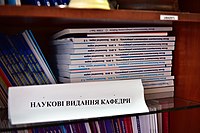User talk:Alexbateman/Archive 2
| This is an archive of past discussions with User:Alexbateman. Do not edit the contents of this page. If you wish to start a new discussion or revive an old one, please do so on the current talk page. |
| Archive 1 | Archive 2 | Archive 3 |
ISCB Wikipedia Competition: call for participation
 | The International Society for Computational Biology (ISCB) and WikiProject Computational Biology are pleased to call for participants in the 2017-18 ISCB Wikipedia Competition. The ISCB aims to improve the communication of scientific knowledge to the public at large, and Wikipedia and its sister sites play an increasingly important role in this communication; the ISCB Wikipedia Competition aims to improve the quality of Wikipedia articles relating to computational biology. Entries to the competition are open now! Articles may be claimed until 1 Dec 2017 and the competition closes on 31 Dec 2017. For students/trainees: Entry to the competition is open internationally to students and trainees of any level, both as individuals and as groups. Prizes of up to $500 will be awarded to the best contributions as chosen by a judging panel of experts; these will be awarded at the Intelligent Systems for Molecular Biology conference in Chicago in July 2018. As in previous years, the ISCB encourages competition entries for contributions to Wikipedia in any language, and contributions to Wikidata items. For teachers/trainers: We encourage you to pass this invitation on to your students, or even consider using the competition as part of an in-class assignment. Further details may be found at: Wikipedia:WikiProject Computational Biology/ISCB competition announcement 2017-18. If you wish to opt-out of future mailings from WikiProject Computational Biology, please remove yourself from the mailing list or alternatively to opt-out of all massmessage mailings, you may add Category:Opted-out of message delivery to your user talk page. (Message delivered:MediaWiki message delivery (talk) 18:30, 5 October 2017 (UTC)) |
A page you started (LysM domain) has been reviewed!
Thanks for creating LysM domain, Alexbateman!
Wikipedia editor Nick Moyes just reviewed your page, and wrote this note for you:
Hi, Dr Bateman. You may remember I emailed you earlier this summer about an interview I filmed with Penny Coggill and her time at the Sanger Institute. Here's the final version (very cut down, I'm afraid -starts at 6min 25secs in) which was shown at the 2017 Wikimania conference in Montreal. It apparently went down very well with the audience. Regards, Nick Moyes
To reply, leave a comment on Nick Moyes's talk page.
Learn more about page curation.
Nick Moyes (talk) 21:39, 10 October 2017 (UTC)
Facto Post – Issue 5 – 17 October 2017
Facto Post – Issue 5 – 17 October 2017
 Editorial: AnnotationsAnnotation is nothing new. The glossators of medieval Europe annotated between the lines, or in the margins of legal manuscripts of texts going back to Roman times, and created a new discipline. In the form of web annotation, the idea is back, with texts being marked up inline, or with a stand-off system. Where could it lead?  ContentMine operates in the field of text and data mining (TDM), where annotation, simply put, can add value to mined text. It now sees annotation as a possible advance in semi-automation, the use of human judgement assisted by bot editing, which now plays a large part in Wikidata tools. While a human judgement call of yes/no, on the addition of a statement to Wikidata, is usually taken as decisive, it need not be. The human assent may be passed into an annotation system, and stored: this idea is standard on Wikisource, for example, where text is considered "validated" only when two different accounts have stated that the proof-reading is correct. A typical application would be to require more than one person to agree that what is said in the reference translates correctly into the formal Wikidata statement. Rejections are also potentially useful to record, for machine learning. As a contribution to data integrity on Wikidata, annotation has much to offer. Some "hard cases" on importing data are much more difficult than average. There are for example biographical puzzles: whether person A in one context is really identical with person B, of the same name, in another context. In science, clinical medicine require special attention to sourcing (WP:MEDRS), and is challenging in terms of connecting findings with the methodology employed. Currently decisions in areas such as these, on Wikipedia and Wikidata, are often made ad hoc. In particular there may be no audit trail for those who want to check what is decided. Annotations are subject to a World Wide Web Consortium standard, and behind the terminology constitute a simple JSON data structure. What WikiFactMine proposes to do with them is to implement the MEDRS guideline, as a formal algorithm, on bibliographical and methodological data. The structure will integrate with those inputs the human decisions on the interpretation of scientific papers that underlie claims on Wikidata. What is added to Wikidata will therefore be supported by a transparent and rigorous system that documents decisions. An example of the possible future scope of annotation, for medical content, is in the first link below. That sort of detailed abstract of a publication can be a target for TDM, adds great value, and could be presented in machine-readable form. You are invited to discuss the detailed proposal on Wikidata, via its talk page. Links
If you wish to receive no further issues of Facto Post, please remove your name from our mailing list. Alternatively, to opt out of all massmessage mailings, you may add Category:Opted-out of message delivery to your user talk page.
Newsletter delivered by MediaWiki message delivery |
MediaWiki message delivery (talk) 08:45, 17 October 2017 (UTC)
Facto Post – Issue 6 – 15 November 2017
Facto Post – Issue 6 – 15 November 2017
 WikidataCon Berlin 28–9 October 2017 Under the heading rerum causas cognescere, the first ever Wikidata conference got under way in the Tagesspiegel building with two keynotes, One was on YAGO, about how a knowledge base conceived ten years ago if you assume automatic compilation from Wikipedia. The other was from manager Lydia Pintscher, on the "state of the data". Interesting rumours flourished: the mix'n'match tool and its 600+ datasets, mostly in digital humanities, to be taken off the hands of its author Magnus Manske by the WMF; a Wikibase incubator site is on its way. Announcements came in talks: structured data on Wikimedia Commons is scheduled to make substantive progress by 2019. The lexeme development on Wikidata is now not expected to make the Wiktionary sites redundant, but may facilitate automated compilation of dictionaries.  And so it went, with five strands of talks and workshops, through to 11 pm on Saturday. Wikidata applies to GLAM work via metadata. It may be used in education, raises issues such as author disambiguation, and lends itself to different types of graphical display and reuse. Many millions of SPARQL queries are run on the site every day. Over the summer a large open science bibliography has come into existence there. Wikidata's fifth birthday party on the Sunday brought matters to a close. See a dozen and more reports by other hands. Links
If you wish to receive no further issues of Facto Post, please remove your name from our mailing list. Alternatively, to opt out of all massmessage mailings, you may add Category:Wikipedians who opt out of message delivery to your user talk page.
Newsletter delivered by MediaWiki message delivery |
MediaWiki message delivery (talk) 10:02, 15 November 2017 (UTC)
ArbCom 2017 election voter message
Hello, Alexbateman. Voting in the 2017 Arbitration Committee elections is now open until 23.59 on Sunday, 10 December. All users who registered an account before Saturday, 28 October 2017, made at least 150 mainspace edits before Wednesday, 1 November 2017 and are not currently blocked are eligible to vote. Users with alternate accounts may only vote once.
The Arbitration Committee is the panel of editors responsible for conducting the Wikipedia arbitration process. It has the authority to impose binding solutions to disputes between editors, primarily for serious conduct disputes the community has been unable to resolve. This includes the authority to impose site bans, topic bans, editing restrictions, and other measures needed to maintain our editing environment. The arbitration policy describes the Committee's roles and responsibilities in greater detail.
If you wish to participate in the 2017 election, please review the candidates and submit your choices on the voting page. MediaWiki message delivery (talk) 18:42, 3 December 2017 (UTC)
Facto Post – Issue 7 – 15 December 2017
Facto Post – Issue 7 – 15 December 2017
 A new bibliographical landscapeAt the beginning of December, Wikidata items on individual scientific articles passed the 10 million mark. This figure contrasts with the state of play in early summer, when there were around half a million. In the big picture, Wikidata is now documenting the scientific literature at a rate that is about eight times as fast as papers are published. As 2017 ends, progress is quite evident. Behind this achievement are a technical advance (fatameh), and bots that do the lifting. Much more than dry migration of metadata is potentially involved, however. If paper A cites paper B, both papers having an item, a link can be created on Wikidata, and the information presented to both human readers, and machines. This cross-linking is one of the most significant aspects of the scientific literature, and now a long-sought open version is rapidly being built up.  The effort for the lifting of copyright restrictions on citation data of this kind has had real momentum behind it during 2017. WikiCite and the I4OC have been pushing hard, with the result that on CrossRef over 50% of the citation data is open. Now the holdout publishers are being lobbied to release rights on citations. But all that is just the beginning. Topics of papers are identified, authors disambiguated, with significant progress on the use of the four million ORCID IDs for researchers, and proposals formulated to identify methodology in a machine-readable way. P4510 on Wikidata has been introduced so that methodology can sit comfortably on items about papers. More is on the way. OABot applies the unpaywall principle to Wikipedia referencing. It has been proposed that Wikidata could assist WorldCat in compiling the global history of book translation. Watch this space. And make promoting #1lib1ref one of your New Year's resolutions. Happy holidays, all!  Links
Editor Charles Matthews, for ContentMine. Please leave feedback for him. Back numbers are here. Reminder: WikiFactMine pages on Wikidata are at WD:WFM. If you wish to receive no further issues of Facto Post, please remove your name from our mailing list. Alternatively, to opt out of all massmessage mailings, you may add Category:Wikipedians who opt out of message delivery to your user talk page.
Newsletter delivered by MediaWiki message delivery |
MediaWiki message delivery (talk) 14:54, 15 December 2017 (UTC)
Facto Post – Issue 8 – 15 January 2018
Facto Post – Issue 8 – 15 January 2018
 Metadata on the MarchFrom the days of hard-copy liner notes on music albums, metadata have stood outside a piece or file, while adding to understanding of where it comes from, and some of what needs to be appreciated about its content. In the GLAM sector, the accumulation of accurate metadata for objects is key to the mission of an institution, and its presentation in cataloguing. Today Wikipedia turns 17, with worlds still to conquer. Zooming out from the individual GLAM object to the ontology in which it is set, one such world becomes apparent: GLAMs use custom ontologies, and those introduce massive incompatibilities. From a recent article by sadads, we quote the observation that "vocabularies needed for many collections, topics and intellectual spaces defy the expectations of the larger professional communities." A job for the encyclopedist, certainly. But the data-minded Wikimedian has the advantages of Wikidata, starting with its multilingual data, and facility with aliases. The controlled vocabulary — sometimes referred to as a "thesaurus" as term of art — simplifies search: if a "spade" must be called that, rather than "shovel", it is easier to find all spade references. That control comes at a cost.   Case studies in that article show what can lie ahead. The schema crosswalk, in jargon, is a potential answer to the GLAM Babel of proliferating and expanding vocabularies. Even if you have no interest in Wikidata as such, simply vocabularies V and W, if both V and W are matched to Wikidata, then a "crosswalk" arises from term v in V to w in W, whenever v and w both match to the same item d in Wikidata. For metadata mobility, match to Wikidata. It's apparently that simple: infrastructure requirements have turned out, so far, to be challenges that can be met. Links
Editor Charles Matthews, for ContentMine. Please leave feedback for him. Back numbers are here. Reminder: WikiFactMine pages on Wikidata are at WD:WFM. If you wish to receive no further issues of Facto Post, please remove your name from our mailing list. Alternatively, to opt out of all massmessage mailings, you may add Category:Wikipedians who opt out of message delivery to your user talk page.
Newsletter delivered by MediaWiki message delivery |
MediaWiki message delivery (talk) 12:37, 15 January 2018 (UTC)
ISCB Wikipedia Competition 2018: entries open!
 | The International Society for Computational Biology (ISCB) and WikiProject Computational Biology are pleased to call for participants in the 2018 ISCB Wikipedia Competition. The ISCB aims to improve the communication of scientific knowledge to the public at large, and Wikipedia and its sister sites play an increasingly important role in this communication; the ISCB Wikipedia Competition aims to improve the quality of Wikipedia articles relating to computational biology. Entries to the competition are open now; the competition closes on 31 Dec 2018. For students/trainees: Entry to the competition is open internationally to students and trainees of any level, both as individuals and as groups. Prizes of up to $500 will be awarded to the best contributions as chosen by a judging panel of experts; these will be awarded at the ISMB/ECCB conference in Basel, Switzerland in July 2019. As in previous years, the ISCB encourages competition entries for contributions to Wikipedia in any language, and contributions to Wikidata items. For teachers/trainers: We encourage you to pass this invitation on to your students, and consider using the competition as part of an in-class assignment. Further details may be found at: Wikipedia:WikiProject Computational Biology/ISCB competition announcement 2018. If you wish to opt-out of future mailings from WikiProject Computational Biology, please remove yourself from the mailing list or alternatively to opt-out of all massmessage mailings, you may add Category:Opted-out of message delivery to your user talk page. (Message delivered:MediaWiki message delivery (talk) 12:02, 1 February 2018 (UTC)) |
Facto Post – Issue 9 – 5 February 2018
Facto Post – Issue 9 – 5 February 2018
 Wikidata as HubOne way of looking at Wikidata relates it to the semantic web concept, around for about as long as Wikipedia, and realised in dozens of distributed Web institutions. It sees Wikidata as supplying central, encyclopedic coverage of linked structured data, and looks ahead to greater support for "federated queries" that draw together information from all parts of the emerging network of websites.  Another perspective might be likened to a photographic negative of that one: Wikidata as an already-functioning Web hub. Over half of its properties are identifiers on other websites. These are Wikidata's "external links", to use Wikipedia terminology: one type for the DOI of a publication, another for the VIAF page of an author, with thousands more such. Wikidata links out to sites that are not nominally part of the semantic web, effectively drawing them into a larger system. The crosswalk possibilities of the systematic construction of these links was covered in Issue 8. Wikipedia:External links speaks of them as kept "minimal, meritable, and directly relevant to the article." Here Wikidata finds more of a function. On viaf.org one can type a VIAF author identifier into the search box, and find the author page. The Wikidata Resolver tool, these days including Open Street Map, Scholia etc., allows this kind of lookup. The hub tool by maxlath takes a major step further, allowing both lookup and crosswalk to be encoded in a single URL. Links
Editor Charles Matthews, for ContentMine. Please leave feedback for him. Back numbers are here. Reminder: WikiFactMine pages on Wikidata are at WD:WFM. If you wish to receive no further issues of Facto Post, please remove your name from our mailing list. Alternatively, to opt out of all massmessage mailings, you may add Category:Wikipedians who opt out of message delivery to your user talk page.
Newsletter delivered by MediaWiki message delivery |
MediaWiki message delivery (talk) 11:50, 5 February 2018 (UTC)
Facto Post – Issue 10 – 12 March 2018
Facto Post – Issue 10 – 12 March 2018
 Milestone for mix'n'matchAround the time in February when Wikidata clicked past item Q50000000, another milestone was reached: the mix'n'match tool uploaded its 1000th dataset. Concisely defined by its author, Magnus Manske, it works "to match entries in external catalogs to Wikidata". The total number of entries is now well into eight figures, and more are constantly being added: a couple of new catalogs each day is normal. Since the end of 2013, mix'n'match has gradually come to play a significant part in adding statements to Wikidata. Particularly in areas with the flavour of digital humanities, but datasets can of course be about practically anything. There is a catalog on skyscrapers, and two on spiders. These days mix'n'match can be used in numerous modes, from the relaxed gamified click through a catalog looking for matches, with prompts, to the fantastically useful and often demanding search across all catalogs. I'll type that again: you can search 1000+ datasets from the simple box at the top right. The drop-down menu top left offers "creation candidates", Magnus's personal favourite. m:Mix'n'match/Manual for more. For the Wikidatan, a key point is that these matches, however carried out, add statements to Wikidata if, and naturally only if, there is a Wikidata property associated with the catalog. For everyone, however, the hands-on experience of deciding of what is a good match is an education, in a scholarly area, biographical catalogs being particularly fraught. Underpinning recent rapid progress is an open infrastructure for scraping and uploading. Congratulations to Magnus, our data Stakhanovite! Links
Editor Charles Matthews, for ContentMine. Please leave feedback for him. Back numbers are here. Reminder: WikiFactMine pages on Wikidata are at WD:WFM. If you wish to receive no further issues of Facto Post, please remove your name from our mailing list. Alternatively, to opt out of all massmessage mailings, you may add Category:Wikipedians who opt out of message delivery to your user talk page.
Newsletter delivered by MediaWiki message delivery |
MediaWiki message delivery (talk) 12:26, 12 March 2018 (UTC)
Facto Post – Issue 11 – 9 April 2018
Facto Post – Issue 11 – 9 April 2018
 The 100 Skins of the OnionOpen Citations Month, with its eminently guessable hashtag, is upon us. We should be utterly grateful that in the past 12 months, so much data on which papers cite which other papers has been made open, and that Wikidata is playing its part in hosting it as "cites" statements. At the time of writing, there are 15.3M Wikidata items that can do that. Pulling back to look at open access papers in the large, though, there is is less reason for celebration. Access in theory does not yet equate to practical access. A recent LSE IMPACT blogpost puts that issue down to "heterogeneity". A useful euphemism to save us from thinking that the whole concept doesn't fall into the realm of the oxymoron. Some home truths: aggregation is not content management, if it falls short on reusability. The PDF file format is wedded to how humans read documents, not how machines ingest them. The salami-slicer is our friend in the current downloading of open access papers, but for a better metaphor, think about skinning an onion, laboriously, 100 times with diminishing returns. There are of the order of 100 major publisher sites hosting open access papers, and the predominant offer there is still a PDF.  From the discoverability angle, Wikidata's bibliographic resources combined with the SPARQL query are superior in principle, by far, to existing keyword searches run over papers. Open access content should be managed into consistent HTML, something that is currently strenuous. The good news, such as it is, would be that much of it is already in XML. The organisational problem of removing further skins from the onion, with sensible prioritisation, is certainly not insuperable. The CORE group (the bloggers in the LSE posting) has some answers, but actually not all that is needed for the text and data mining purposes they highlight. The long tail, or in other words the onion heart when it has become fiddly beyond patience to skin, does call for a pis aller. But the real knack is to do more between the XML and the heart. Links
Editor Charles Matthews, for ContentMine. Please leave feedback for him. Back numbers are here. Reminder: WikiFactMine pages on Wikidata are at WD:WFM. If you wish to receive no further issues of Facto Post, please remove your name from our mailing list. Alternatively, to opt out of all massmessage mailings, you may add Category:Wikipedians who opt out of message delivery to your user talk page.
Newsletter delivered by MediaWiki message delivery |
MediaWiki message delivery (talk) 16:25, 9 April 2018 (UTC)
Facto Post – Issue 12 – 28 May 2018
Facto Post – Issue 12 – 28 May 2018
 ScienceSource fundedThe Wikimedia Foundation announced full funding of the ScienceSource grant proposal from ContentMine on May 18. See the ScienceSource Twitter announcement and 60 second video.
The proposal includes downloading 30,000 open access papers, aiming (roughly speaking) to create a baseline for medical referencing on Wikipedia. It leaves open the question of how these are to be chosen. The basic criteria of WP:MEDRS include a concentration on secondary literature. Attention has to be given to the long tail of diseases that receive less current research. The MEDRS guideline supposes that edge cases will have to be handled, and the premature exclusion of publications that would be in those marginal positions would reduce the value of the collection. Prophylaxis misses the point that gate-keeping will be done by an algorithm. Two well-known but rather different areas where such considerations apply are tropical diseases and alternative medicine. There are also a number of potential downloading troubles, and these were mentioned in Issue 11. There is likely to be a gap, even with the guideline, between conditions taken to be necessary but not sufficient, and conditions sufficient but not necessary, for candidate papers to be included. With around 10,000 recognised medical conditions in standard lists, being comprehensive is demanding. With all of these aspects of the task, ScienceSource will seek community help. Links
Editor Charles Matthews, for ContentMine. Please leave feedback for him. Back numbers are here. Reminder: WikiFactMine pages on Wikidata are at WD:WFM. ScienceSource pages will be announced there, and in this mass message. If you wish to receive no further issues of Facto Post, please remove your name from our mailing list. Alternatively, to opt out of all massmessage mailings, you may add Category:Wikipedians who opt out of message delivery to your user talk page.
Newsletter delivered by MediaWiki message delivery |
MediaWiki message delivery (talk) 10:16, 28 May 2018 (UTC)
Facto Post – Issue 13 – 29 May 2018
Facto Post – Issue 13 – 29 May 2018
 The Editor is Charles Matthews, for ContentMine. Please leave feedback for him, on his User talk page.
To subscribe to Facto Post go to Wikipedia:Facto Post mailing list. For the ways to unsubscribe, see the footer.
Facto Post enters its second year, with a Cambridge Blue (OK, Aquamarine) background, a new logo, but no Cambridge blues. On-topic for the ScienceSource project is a project page here. It contains some case studies on how the WP:MEDRS guideline, for the referencing of articles at all related to human health, is applied in typical discussions. Close to home also, a template, called {{medrs}} for short, is used to express dissatisfaction with particular references. Technology can help with patrolling, and this Petscan query finds over 450 articles where there is at least one use of the template. Of course the template is merely suggesting there is a possible issue with the reliability of a reference. Deciding the truth of the allegation is another matter. This maintenance issue is one example of where ScienceSource aims to help. Where the reference is to a scientific paper, its type of algorithm could give a pass/fail opinion on such references. It could assist patrollers of medical articles, therefore, with the templated references and more generally. There may be more to proper referencing than that, indeed: context, quite what the statement supported by the reference expresses, prominence and weight. For that kind of consideration, case studies can help. But an algorithm might help to clear the backlog. 
If you wish to receive no further issues of Facto Post, please remove your name from our mailing list. Alternatively, to opt out of all massmessage mailings, you may add Category:Wikipedians who opt out of message delivery to your user talk page.
Newsletter delivered by MediaWiki message delivery |
MediaWiki message delivery (talk) 18:19, 29 June 2018 (UTC)
Facto Post – Issue 14 – 21 July 2018
Facto Post – Issue 14 – 21 July 2018
 The Editor is Charles Matthews, for ContentMine. Please leave feedback for him, on his User talk page.
To subscribe to Facto Post go to Wikipedia:Facto Post mailing list. For the ways to unsubscribe, see the footer.
Officially it is "bridging the gaps in knowledge", with Wikimania 2018 in Cape Town paying tribute to the southern African concept of ubuntu to implement it. Besides face-to-face interactions, Wikimedians do need their power sources.  Facto Post interviewed Jdforrester, who has attended every Wikimania, and now works as Senior Product Manager for the Wikimedia Foundation. His take on tackling the gaps in the Wikimedia movement is that "if we were an army, we could march in a column and close up all the gaps". In his view though, that is a faulty metaphor, and it leads to a completely false misunderstanding of the movement, its diversity and different aspirations, and the nature of the work as "fighting" to be done in the open sector. There are many fronts, and as an eventualist he feels the gaps experienced both by editors and by users of Wikimedia content are inevitable. He would like to see a greater emphasis on reuse of content, not simply its volume. If that may not sound like radicalism, the Decolonizing the Internet conference here organized jointly with Whose Knowledge? can redress the picture. It comes with the claim to be "the first ever conference about centering marginalized knowledge online". 
If you wish to receive no further issues of Facto Post, please remove your name from our mailing list. Alternatively, to opt out of all massmessage mailings, you may add Category:Wikipedians who opt out of message delivery to your user talk page.
Newsletter delivered by MediaWiki message delivery |
MediaWiki message delivery (talk) 06:10, 21 July 2018 (UTC)
8th ISCB Wikipedia Competition: entries open!
 | The International Society for Computational Biology (ISCB) and WikiProject Computational Biology are pleased to call for participants in the 8th ISCB Wikipedia Competition. The ISCB aims to improve the communication of scientific knowledge to the public at large, and Wikipedia plays an increasingly important role in this communication; the ISCB Wikipedia Competition aims to improve the quality of Wikipedia articles relating to computational biology. Entries to the competition are open now; the competition closes on 17 May 2019. For students/trainees: Entry to the competition is open internationally to students and trainees of any level, both as individuals and as groups. Prizes of up to $500 will be awarded to the best contributions as chosen by a judging panel of experts; these will be awarded at the ISMB/ECCB conference in Basel, Switzerland in July 2019. As in previous years, the ISCB encourages competition entries for contributions to Wikipedia in any language. For teachers/trainers: We encourage you to pass this invitation on to your students, and consider using the competition as part of an in-class assignment. Further details may be found at: Wikipedia:WikiProject Computational Biology/8th ISCB Wikipedia competition announcement. If you wish to opt-out of future mailings from WikiProject Computational Biology, please remove yourself from the mailing list or alternatively to opt-out of all massmessage mailings, you may add Category:Opted-out of message delivery to your user talk page. (Message delivered:MediaWiki message delivery (talk) 17:12, 18 August 2018 (UTC)) |
Facto Post – Issue 15 – 21 August 2018
Facto Post – Issue 15 – 21 August 2018
 The Editor is Charles Matthews, for ContentMine. Please leave feedback for him, on his User talk page.
To subscribe to Facto Post go to Wikipedia:Facto Post mailing list. For the ways to unsubscribe, see the footer.
 To grasp the nettle, there are rare diseases, there are tropical diseases and then there are "neglected diseases". Evidently a rare enough disease is likely to be neglected, but neglected disease these days means a disease not rare, but tropical, and most often infectious or parasitic. Rare diseases as a group are dominated, in contrast, by genetic diseases. A major aspect of neglect is found in tracking drug discovery. Orphan drugs are those developed to treat rare diseases (rare enough not to have market-driven research), but there is some overlap in practice with the WHO's neglected diseases, where snakebite, a "neglected public health issue", is on the list. From an encyclopedic point of view, lack of research also may mean lack of high-quality references: the core medical literature differs from primary research, since it operates by aggregating trials. This bibliographic deficit clearly hinders Wikipedia's mission. The ScienceSource project is currently addressing this issue, on Wikidata. Its Wikidata focus list at WD:SSFL is trying to ensure that neglect does not turn into bias in its selection of science papers.
If you wish to receive no further issues of Facto Post, please remove your name from our mailing list. Alternatively, to opt out of all massmessage mailings, you may add Category:Wikipedians who opt out of message delivery to your user talk page.
Newsletter delivered by MediaWiki message delivery |
MediaWiki message delivery (talk) 13:23, 21 August 2018 (UTC)
Facto Post – Issue 16 – 30 September 2018
Facto Post – Issue 16 – 30 September 2018
 The Editor is Charles Matthews, for ContentMine. Please leave feedback for him, on his User talk page.
To subscribe to Facto Post go to Wikipedia:Facto Post mailing list. For the ways to unsubscribe, see the footer.
 In an ideal world ... no, bear with your editor for just a minute ... there would be a format for scientific publishing online that was as much a standard as SI units are for the content. Likewise cataloguing publications would not be onerous, because part of the process would be to generate uniform metadata. Without claiming it could be the mythical free lunch, it might be reasonably be argued that sandwiches can be packaged much alike and have barcodes, whatever the fillings. The best on offer, to stretch the metaphor, is the meal kit option, in the form of XML. Where scientific papers are delivered as XML downloads, you get all the ingredients ready to cook. But have to prepare the actual meal of slow food yourself. See Scholarly HTML for a recent pass at heading off XML with HTML, in other words in the native language of the Web. The argument from real life is a traditional mixture of frictional forces, vested interests, and the classic irony of the principle of unripe time. On the other hand, discoverability actually diminishes with the prolific progress of science publishing. No, it really doesn't scale. Wikimedia as movement can do something in such cases. We know from open access, we grok the Web, we have our own horse in the HTML race, we have Wikidata and WikiJournal, and we have the chops to act. 
If you wish to receive no further issues of Facto Post, please remove your name from our mailing list. Alternatively, to opt out of all massmessage mailings, you may add Category:Wikipedians who opt out of message delivery to your user talk page.
Newsletter delivered by MediaWiki message delivery |
MediaWiki message delivery (talk) 17:57, 30 September 2018 (UTC)
